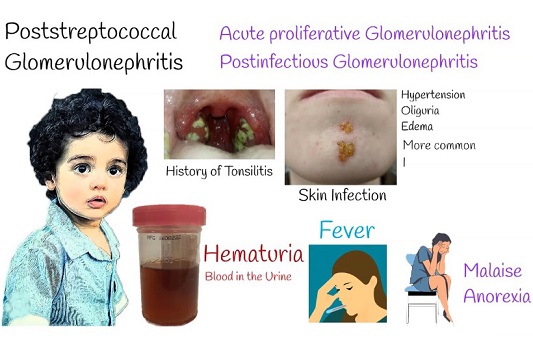Medical News: Outbreak of Acute Post-Streptococcal Glomerulonephritis (APSGN), An Infectious Kidney Disease, Reported In Queensland, Australia
Nikhil Prasad Fact checked by:Thailand Medical News Team Nov 30, 2023 1 year, 4 months, 2 weeks, 4 days, 2 hours, 10 minutes ago
Medical News: In a concerning development, an outbreak of Acute Post-Streptococcal Glomerulonephritis (APSGN), an infectious kidney disease, has been reported in the Aboriginal community of Yarrabah, located south of Cairns in Queensland, Australia. The situation is further complicated by a shortage of the preferred antibiotic, Bicillin L-A, hampering effective treatment. As healthcare practitioners strive to manage this crisis, six confirmed cases have been identified through laboratory diagnostics, with an additional 23 cases under investigation.
 The Nature of APSGN and its Impact
The Nature of APSGN and its Impact
APSGN is an inflammatory disease of the kidneys, typically triggered by skin sores or a sore throat. It represents an immune system response to an infection with streptococcus bacteria, specifically group A β-hemolytic streptococcus (GAS). The disease can manifest with symptoms such as microscopic or gross hematuria, arterial hypertension, edema, and acute kidney injury, often following a self-limiting course. In the case of Yarrabah, the affected individuals are primarily children aged two to 15 years old.
Challenges in Diagnosis and Treatment
Gurriny Yealamucka Health Service director Jason King emphasized the challenges posed by the subtle symptoms of APSGN, noting that it is a serious infectious condition with the potential to rapidly spread, causing long-term health effects. Complicating matters, the preferred treatment for APSGN, rheumatic heart disease, and syphilis -Bicillin L-A -is facing a global shortage, leaving healthcare professionals with the daunting task of resorting to second-line alternatives.
Antibiotic Shortage: A Global predicament
The shortage of Bicillin L-A is not unique to Yarrabah but reflects a global challenge. National Pharmacy Guild Queensland branch president Chris Owen highlighted the nation's vulnerability to worldwide trends in antibiotic availability. Over the past six months, antibiotics, including Bicillin L-A, have been a low priority in the global supply chain. This has left healthcare providers grappling with unforeseen spikes in cases and inadequate supplies to meet the rising demand, particularly in remote communities.
Australia's Antibiotic Stockpile Policy
Australia's antibiotic stockpile policy, requiring a four to six-month reserve of certain medications listed on the Pharmaceutical Benefits Scheme, aims to ensure preparedness for unforeseen circumstances. However, as Mr Owen explained to local
Medical News outlets that estimating demand accurately remains a challenge, leading to instances where spikes in cases outpace the available supply. The consequences are acutely felt in regions like Yarrabah, where the demand for Bicillin L-A is critical in treating APSGN, rheumatic heart disease, and rising rates of syphilis.
Rising Syphilis Rates and Additional Concerns
In addition to the APSGN outbreak, far north Queensland and the Torres Strait Islands have witnessed a concerning rise in syphilis cases over the past three years. Bicillin L-A, the same antibiotic used for treating APSGN, is instrum
ental in addressing this surge in syphilis cases. The impact is disproportionately felt in remote communities, with 2023 marking the highest annual increase in syphilis rates since the disease became notifiable in 2004. The situation underscores the broader public health implications of the antibiotic shortage.
Government Response and Global Collaboration
The Therapeutic Goods Administration (TGA) acknowledged the critical importance of a reliable antibiotic supply, especially in light of the APSGN outbreak in Yarrabah. While Pfizer, the manufacturer of Bicillin L-A, foresees a global shortage until November next year, the TGA has taken steps to ensure equitable distribution by allowing wholesalers to constrain supply. Collaborative efforts involving federal, state, and territory government bodies are underway to address the complex challenge posed by the antibiotic shortage and its impact on vulnerable communities.
Community Vigilance and Preventive Measures
In Yarrabah, families are urged to remain vigilant as the inflammatory kidney disease continues to spread. Gurriny Yealamucka Health Services emphasizes that while APSGN is not contagious, the bacteria causing the disease can be passed from person to person. Preventive measures, such as daily washing with soap, covering sores, and regular laundering of clothing and bedding, are crucial. Parents and families are advised to promptly treat any skin sores and seek medical attention if symptoms such as dark-colored urine, swollen eyes or feet, headache, fever, or abdominal pain arise.
Conclusion
The outbreak of APSGN in Yarrabah, exacerbated by the shortage of Bicillin L-A, sheds light on the vulnerabilities within global and national healthcare systems. As authorities work to mitigate the impact on affected communities, it underscores the urgent need for collaborative efforts in addressing antibiotic shortages, ensuring timely and equitable distribution, and fortifying public health infrastructure to respond to emerging infectious diseases. The crisis in Yarrabah serves as a poignant reminder of the interconnectedness of global health and the imperative for sustained efforts in safeguarding vulnerable populations.
For the latest
Medical News, keep on logging to Thailand Medical News.
